Recommendations For Protecting Incarcerated Youth And Adults During The COVID-19 Pandemic

Transcription
RECOMMENDATIONS FOR PROTECTING INCARCERATED YOUTH AND ADULTS DURING THE COVID-19 PANDEMIC
In the midst of the COVID-19 pandemic, U.S. prisons and jails face a public health catastrophe due to existing unsanitary and overcrowded conditions of confinement. Medical experts have called for reductions in incarceration levels to limit overcrowding and protect those individuals in custody who are at high risk of serious illness and death from COVID-19. To help stem the spread of COVID-19, Congress must take immediate action to reduce the number of people detained by federal agencies, including the Bureau of Prisons and Immigration and Customs Enforcement. Congress also should incentivize states and localities to reduce levels of youth and adult incarceration and detention in order to protect vulnerable populations from COVID-19. If Congress does not immediately respond to the risk of COVID-19 outbreaks at incarceration and detention facilities nationwide, it will face a humanitarian crisis that will impact families and communities across the nation and prevent the U.S. from fully overcoming the domestic COVID-19 epidemic. The Justice Roundtable, a national coalition of more than 100 organizations, urges Congress to act on the following recommendations in its third COVID-19 response package under development now.
A. Protect the Health and Safety of Youth and Adults Who Are Incarcerated or Detained as well as Those Who Work at and Visit Federal, State, and Local Prisons, Jails, Detention Centers, and Secure Confinement Facilities During the COVID-19 Epidemic
1. Congress should provide funding to ensure that COVID-19 testing, prevention, care, and treatment services should be available at no cost to those who are incarcerated or detained. Federal funding should support federal Bureau of Prisons, states and localities to ensure that all individuals, including adults and youth who are incarcerated, detained, or confined and who test positive for COVID-19 receive timely, appropriate, adequate, and cost-free care and treatment services, including as a first choice removing incarcerated and detained youth and adults to an external healthcare facility to receive care and treatment.
2. Congress also should allocate funding to eliminate all co-pays for healthcare provided in federal, state, and local prisons, jails, detention centers, and secure confinement facilities for youth and adults during the COVID-19 epidemic-including co-pays related to medical testing, preventative measures, and treatment for incarcerated or detained individuals at risk for or diagnosed with COVID-19.
3. Congress should provide federal funding to the federal Bureau of Prisons, states, and localities to ensure that youth and adults who are incarcerated or detained in federal, state, or local prisons, jails, detention centers, and secure confinement facilities and who have been exposed to COVID-19 and are in need of quarantine are able to move to appropriate medical or other safe settings outside of the prison, jail, detention center, or secure confinement facility to receive free care and treatment. Facilities that receive these funds shall not quarantine youth and adults within unsanitary and unsafe jails, prisons, detention, and secure confinement facilities, and these facilities should not use extended solitary confinement as a substitution for providing youth and adults who are incarcerated or confined and who are exposed to COVID-19 with proper medical care and appropriate, safe housing during the epidemic.
4. CONGRESS should immediately waive Section 1905(a)(A) of the Social Security Act (commonly referred to as the inmate exclusion provision) on an emergency basis until at least 6 months after the COVID-19 crisis is over. This provision prohibits use of Medicaid funding (and other federal funds) for medical care provided to "inmates of a public institution." This additionally applies to individuals who are incarcerated but have not been convicted of a crime (54,000 people are currently incarcerated in pre-trial detention). Removing this provision would provide significant relief to states and counties whose budgets are dramatically impacted by the COVID-19 outbreak and other health issues.
5. Congress should grant states limited new flexibility to restart benefits for Medicaid-eligible incarcerated individuals 30 days prior to release. If States are permitted to restart Medicaid benefits prior to release from custody, facilities and communities will be able to provide more effective care, treatment, and coordination for COVID-19 and other health conditions while supporting a more effective transition to community-based care.
6. Provide federal funding to ensure that federal, state, and local prisons, jails, detention centers, and secure confinement facilities holding youth and adults follows CDC recommendations for COVID-19 response, including:
a. Each facility has CDC-recommended hand sanitizer, adequate soap, medical care, comprehensive sanitation and cleaning of facilities, personal protective equipment, and other safety measures provided free of charge to those who are incarcerated or detained as well as to those who work and volunteer in facilities.
b. Designated bathrooms are identified for use by people who have symptoms of COVID-19.
c. Bathrooms, visitation, and other facility common areas are sanitized daily.
d. Facilities follow CDC guidelines for workplaces, including that staff and visitors stay home if they are sick; follow proper coughing, sneezing, and hand-washing recommendations; and execution of routine environmental cleaning.
e. Persons who are incarcerated and symptomatic are treated with dignity and respect, not stigmatized and punished.
7. Congress should provide federal funding to ensure that individuals who are incarcerated or detained in federal, state, and local facilities have access to communication during the COVID-19 epidemic, including:
a. Youth and adults who are incarcerated or detained and their families, friends, and attorneys have access to regular communication channels, including but not limited to cost-free phone calls (including confidential phone calls and videoconferencing with attorneys), cost-free video conferencing, cost-free email, and full access to postage mail.
b. Incarceration and detention facilities maintain access to counsel and preserve family visitation rights as long as possible and with precautions (such as glass wall barriers).
c. Federal, state, and local prison, jail, detention, and secure confinement facilities for youth and adults do not implement COVID-19 containment measures that result in the denial of due process, such as postponing court appearances in violation of speedy trial guarantees or creating barriers that inhibit access to counsel.
8. Congress should provide resources to support information dissemination, transparency, and accountability by requiring that the Federal Bureau of Prisons, state and local prisons, jail, detention centers, and secure confinement facilities publicly:
a. Release information about plants and procedures to address COVID-19 within federal, state, and local prisons, jails, detention, and secure confinement facilities for youth and adults.
b. Update the number of COVID-19 cases that exist in their jurisdiction's prisons, jails, detention, and secure confinement facilities.
c. Provide prompt and accurate information about the number of COVID-19 fatalities.
d. Inform attorneys, families, and friends of youth and adults in custody when individuals are ill with COVID-19 and continue to provide timely, up-to-date information about the health of loved ones.
e. Provide information about visitation, communication policies, and lockdowns.
f. Give updates on healthcare services being provided.
g. Distribute information cost-free via mobile notification, email, and internet announcements.
B. Prevent the Spread of COVID-9 -- Reduce Incarceration Levels of Youth and Adults in Detention Facilities, Jails, and Prisons.
1. Congress should incentivize the Department of Justice and state and local law enforcement to avoid detention of any new arrestee unless they pose a risk of serious injury to a reasonably identifiable person.
a. In particular, stop detention of vulnerable individuals, including people over age 50, those with chronic illness, pregnant people, those with asthma, cancer, heart disease, lung disease, diabetes, HIV and other diseases or disabilities that make them vulnerable to COVID-19 infection.
b. For the United States Probation Office to immediately suspend filing violations and/or arrests of individuals suspected of supervised release violations that do not involve a serious violent felony, pursuant to 18 USC §3559(c)(2) or a serious physical risk to the community. Reducing these unnecessary incarcerations would reduce the risk of transmitting COVID-19 between facilities (jails) and the community, and vice versa. Instead of arrests on warrants for supervision violations and new indictment cases, greater use of summonses and recalling pending warrants that have not been served if a summons could be substituted.
c. Dates for voluntary surrender for prison sentences if requested by defense counsel should be delayed.
2. Congress should amend the Bail Reform Act to provide that during a pandemic, the government may not seek to detain, and the court may not detain, any person unless the government shows by clear and convincing evidence that the person is likely to cause specific and substantial risk, that the person will cause bodily injury or use violent force against the person of another.
3. Congress should amend the Bail Reform Act to mandate consideration at a pretrial hearing of the conditions of pretrial confinement, including access to adequate medical and mental health treatment, access to medications, and the person's ability to privately consult with counsel and meaningfully prepare a defense.
4. Congress should amend Rule 4 of the Federal Rules of Criminal Procedure to preclude courts from issuing arrest warrants during a pandemic unless the government shows, by clear and convincing evidence, that arrest would be the only way to stop a specific and substantial risk that the person will cause bodily injury or use violent force against the person of another, to express a presumption in favor of issuance of a summons, rather than an arrest warrant; and to mandate the recall of all pending arrest warrants unless the government makes a showing that arrest is necessary to avert a specific and substantial risk of actual injury or violence.
5. Congress should incentivize through federal funding the Department of Justice and state and local officials to release people from incarceration in order to prevent the spread of disease and reduce the threat of infections among incarcerated people at highest risk of serious illness and death from COVID-19.
a. Immediate releases are particularly critical for people over age 50, those with chronic illnesses, pregnant people, those with asthma, cancer, heart disease, lung disease, and diabetes, HIV and other diseases that make them vulnerable to COVID-19 infection.
b. Officials should use all available powers, including but not limited to executive clemency, commutations, furlough, compassionate release, parole, and release on recognizance, to reduce the number of people in jails, prisons, and detention centers. And where possible, create new emergency mechanisms to reduce incarcerated populations.
c. Populations should be reduced to ensure that capacity is such that cells are not shared, there are sufficient medical beds, and enough prison staff to ensure safety for staff, those incarcerated, and visitors.
d. Release all incarcerated people who test positive for COVID-19 to an external healthcare facility to receive care.
e. Release people with 36 months or less remaining on a sentence.
f. Release individuals who are participating in work release or other community release-based programs. These individuals are a low risk to the community as evidenced by their admission into these programs.
6. Congress should Increase the number of people in federal prison allowed to serve 10% of their terms of imprisonment or 6 months in home confinement, as expressly permitted by 18 U.S.C. §3624(c)(2) and expanded by Section 602 of the First Step Act, Pub. L. 115-391. Reducing the general BOP population would also reduce the risk of transmitting a virus in BOP facilities. While this statute pertains to anyone, the BOP should liberally apply this statute for any qualifying elderly or immune-compromised person in custody.
7. Congress should extend the Elderly Home Confinement Program to individuals who are determined to be a higher risk of death from COVID-19.
8. Congress should urge the Bureau of Prisons to immediately increase grants of compassionate release to elderly or immune-compromised inmates, and Congress should amend 18 USC 3582(c) to waive the 30 day period between when an inmate files his letter with the Warden and when he or she can file a motion with the Court.
9. Congress should incentivize states and localities to release adults and youth from prisons, jail, detention centers and secure confinement facilities by providing an increased federal medical assistance percentage (FMAP) by 2% for any State or jurisdiction that enacts widespread policies that release 10% or more of their State prison population. States may also receive an additional 1% increase in FMAP by working with local jurisdictions to release 15% or more of their local jail population for the duration of the crisis. States and local jurisdictions that maintain these decreases after the immediate COVID-19 crisis has passed shall remain eligible for the increased FMAP.
10. Congress should ensure that public health-initiated adjustments to the federal prison population, including eligibility for the elderly and compassionate release provisions of the First Step Act, also account for people in Bureau of Prisons custody sentenced for a violation of District of Columbia law.
11. Congress should incentivize federal, state and local authorities through federal funding to aid individuals serving sentences in the community, including probation, parole or with some similar community supervision or community corrections status, by:
a. Waiving all fees assessed to those who are in work release or other similar programs who remained detained (some will be unable to go to work and those who can continue to work, should be able to utilize their income to help family members who may be suffering economic effects of the virus).
b. Removing the threat of incarceration for people who are under community supervision to allow people to travel and access medical care, state isolated when necessary, and take care of themselves and their families.
c. Eliminating requirements for in-person check-ins with probation, pretrial services, parole, and/or ICE to prevent the spread of disease.
d. Eliminating restrictions on movement for people under the surveillance of ankle shackles to allow access to medical care, family and loved ones who may need care or support.
e. Assisting people released from prisons with transitional plans that ensure they receive adequate medical care.
f. Reviewing the housing options of anyone in halfway houses to see if home confinement would equally serve the needs of someone leaving prison.
12. Congress should direct Immigration and Customs Enforcement to release people currently detained under their authority, with a high priority for releasing individuals who are elderly, pregnant, people with disabilities, living with HIV, or others who are vulnerable to illness. ICE should also:
a. Cease all local enforcement operations.
b. Postpone all check-ins and mandatory court appearances for at a minimum of during and for at least 30 days after the current National Emergency.
C. Ensure Reentry Supports to Contain and Slow the Spread of COVID-19
1. Congress should provide COVID-19 federal cash assistance to individuals who are released from custody during the epidemic. Individuals impacted by the justice system and their families need direct cash assistance to help them with lost wages, access to food, housing, and other basic needs.
2. Congress should provide funding to federal, state, and local corrections officials and other stakeholders to support transition planning for youth and adults prior to release from federal, state, and local prisons, jail, detention, and secure confinement facilities to ensure connection to critical community-based services upon release. Transition planning should facilitate warm-hand off upon release to community-based services that address urgent health issues, such COVID-19 and the need for Medication Assisted Treatment and other drug treatment and harm reduction services to help prevent drug overdose upon release, as well as nutrition support, housing, and other reentry supports during the COVID-19 epidemic.
3. Congress should provide funding to ensure that youth and adults who are released from custody have access to safe and appropriate housing for the duration of the COVID-19 epidemic.
4. Congress should repeal or waive current federal prohibitions and oppose additional prohibitions on individuals with criminal records from receiving federally funded COVID-19 benefits and supports, including housing, employment, and nutrition assistance. Some state and local jurisdictions and agencies limit access to need-based supports such as SNAP, TANF, and housing assistance for those with certain criminal convictions. Such conviction bans on access to federally supported benefits and resources should not occur during the COVID-19 epidemic.
D. Protect, Don't Exploit, Incarcerated Youth and Adults during the COVID-19 Epidemic
In this time of crisis, officials are looking to incarcerated workers to provide valuable labor but without always keeping them safe and well. Congress must ensure that federal, state, and local officials:
1. Eliminate requirements for incarcerated workers to perform tasks that put them at risk of contracting the disease and allow them to opt-out (waste management, handling corpses/digging graves, etc).
2. Provide all workers with appropriate protective gear (i.e. disposable gloves, coveralls, and masks).
3. Institute a minimum wage for incarcerated people whoa re working. New York state announced incarcerated individuals would be manufacturing hand sanitizer (which they are not allowed to use for their own protection) for less than $1 per hour. This unfair and this exploitative practice must end.
E. Criminalization of Black and Brown Communities is Not a Real Public Health Solution
Within our communities, Black and Brown people already face increased criminalization. Federal, state, and local officials must not use public health orders to further criminalize communities of color as they work hard to survive the COVID-19 pandemic:
1. In the event of emergency lockdown/quarantine, there should not be a criminal punishment for breaching emergency quarantine protocols, failing to disclose COVID-19 symptoms, or for potentially exposing others to the virus.
2. There should not be any criminal penalties for acts of survival, such as taking supplies or resources needed to survive the COVID-19 pandemic.
3. ICE or law enforcement officers should not receive warrants to target community hubs where resources are being distributed to respond to the COVID-19 outbreak.
Other posts by this author
|
2023 may 31

|
2023 mar 20
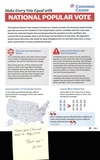
|
2022 aug 23

|
2022 aug 23

|
2022 aug 23

|
2022 aug 23

|
More... |
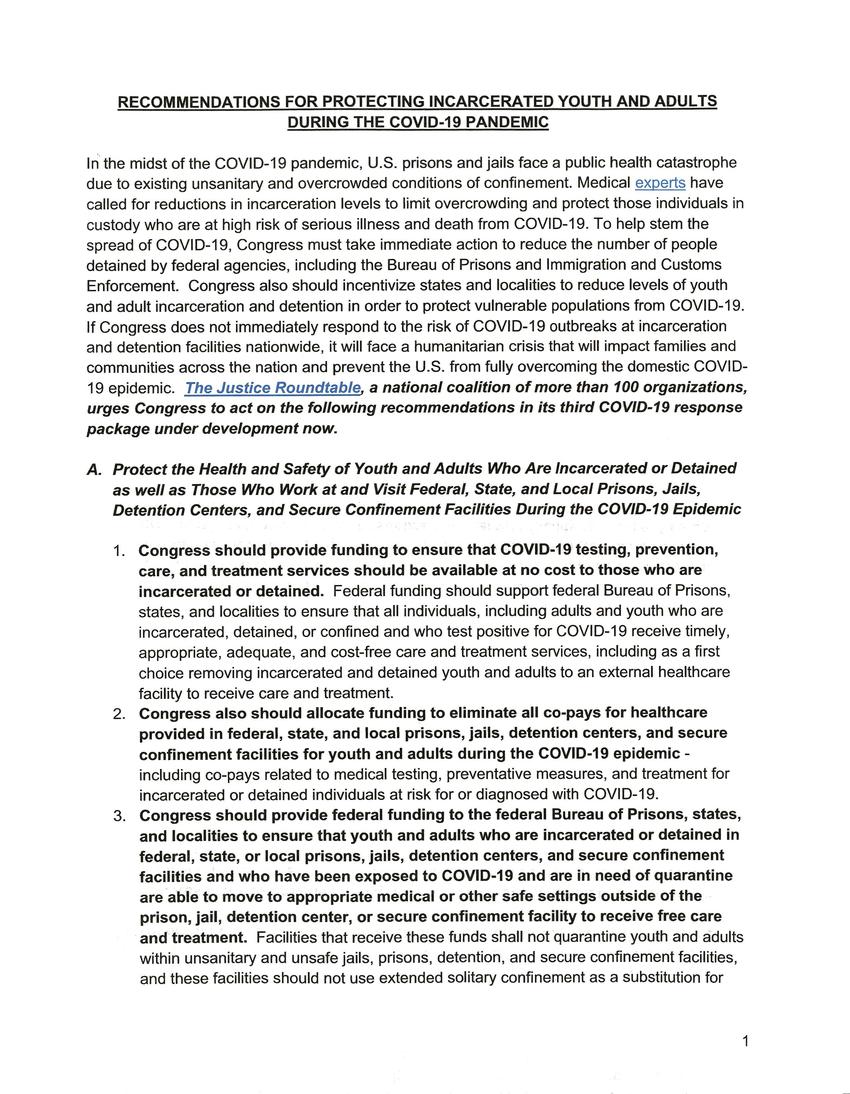
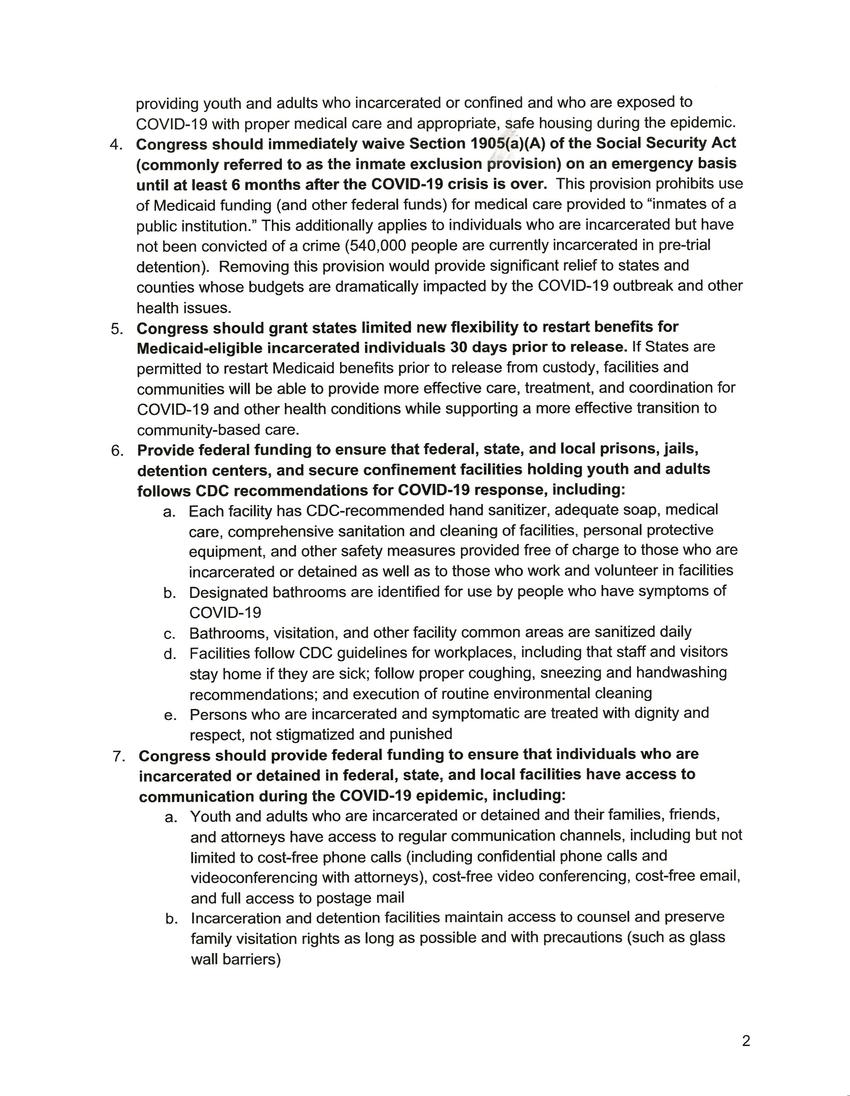
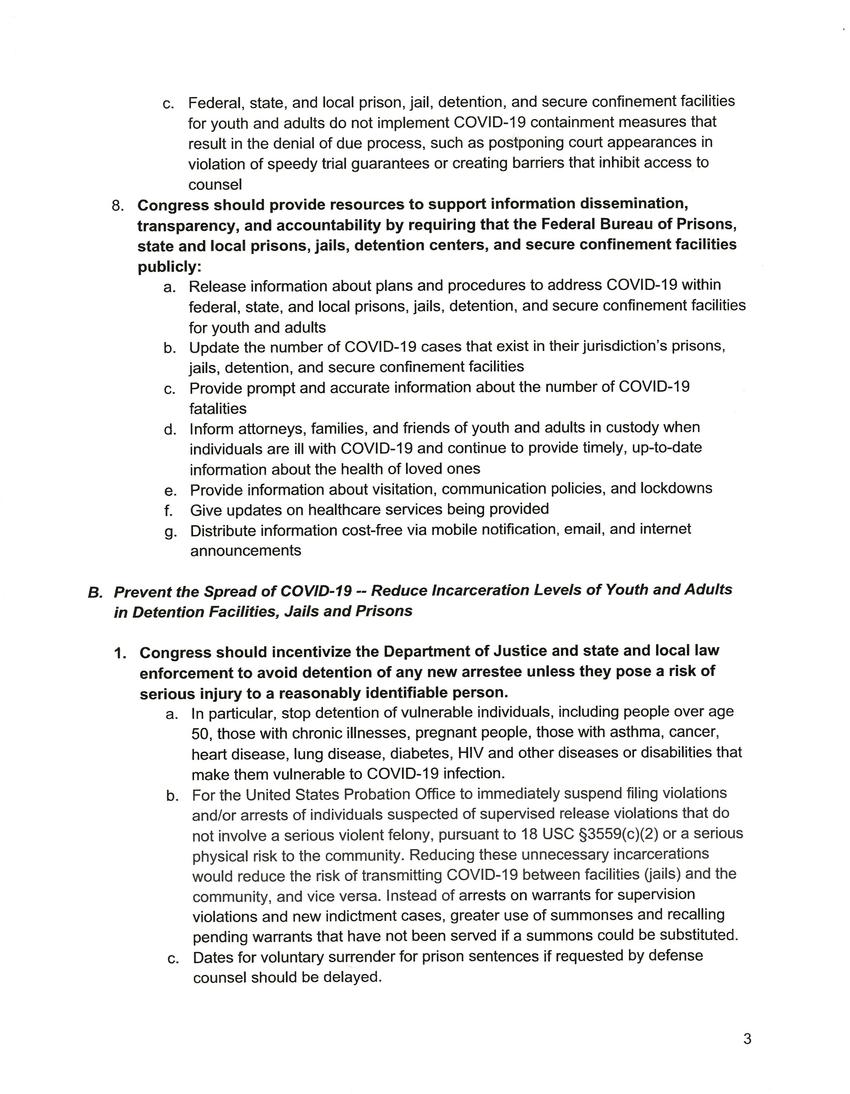
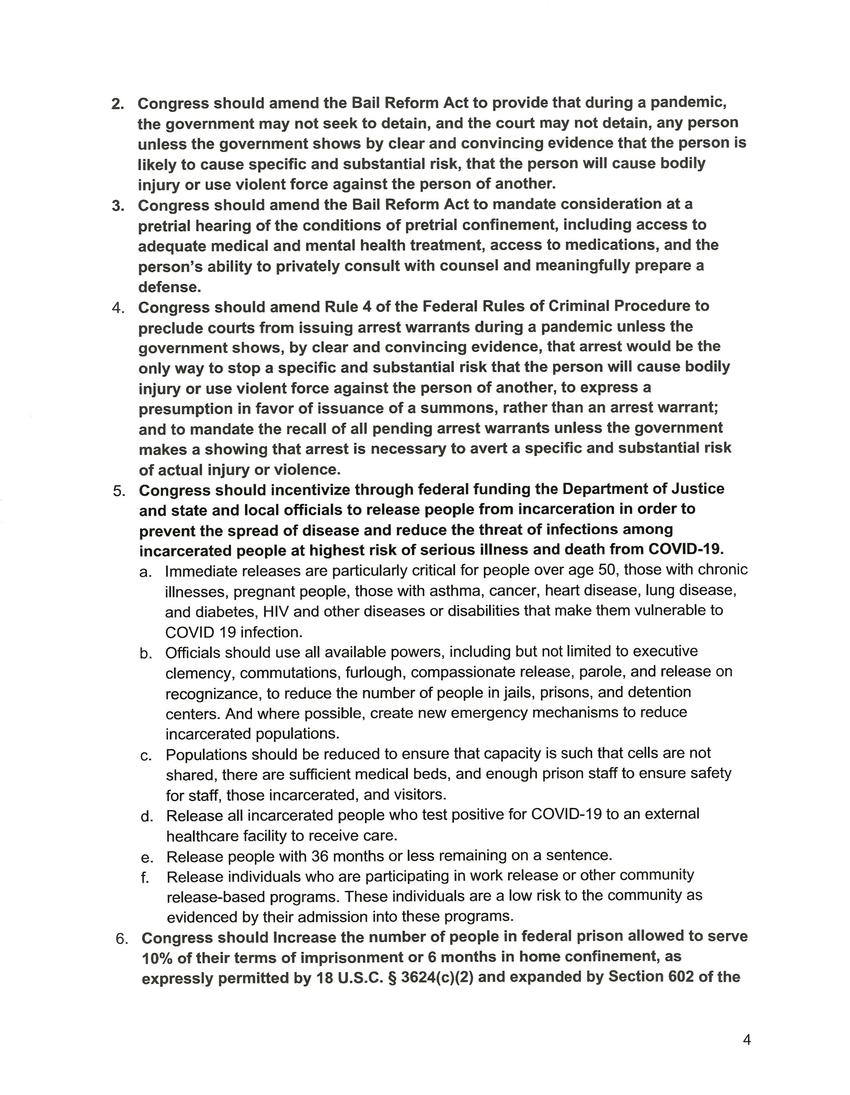
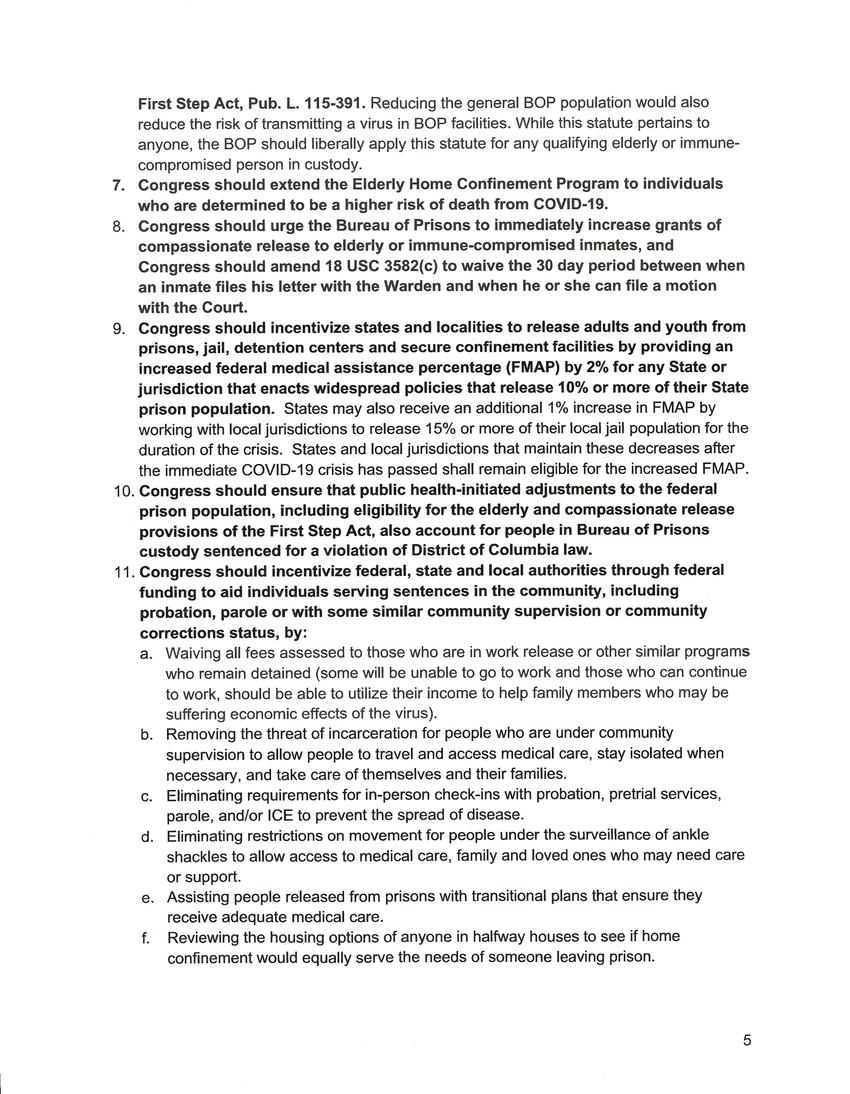
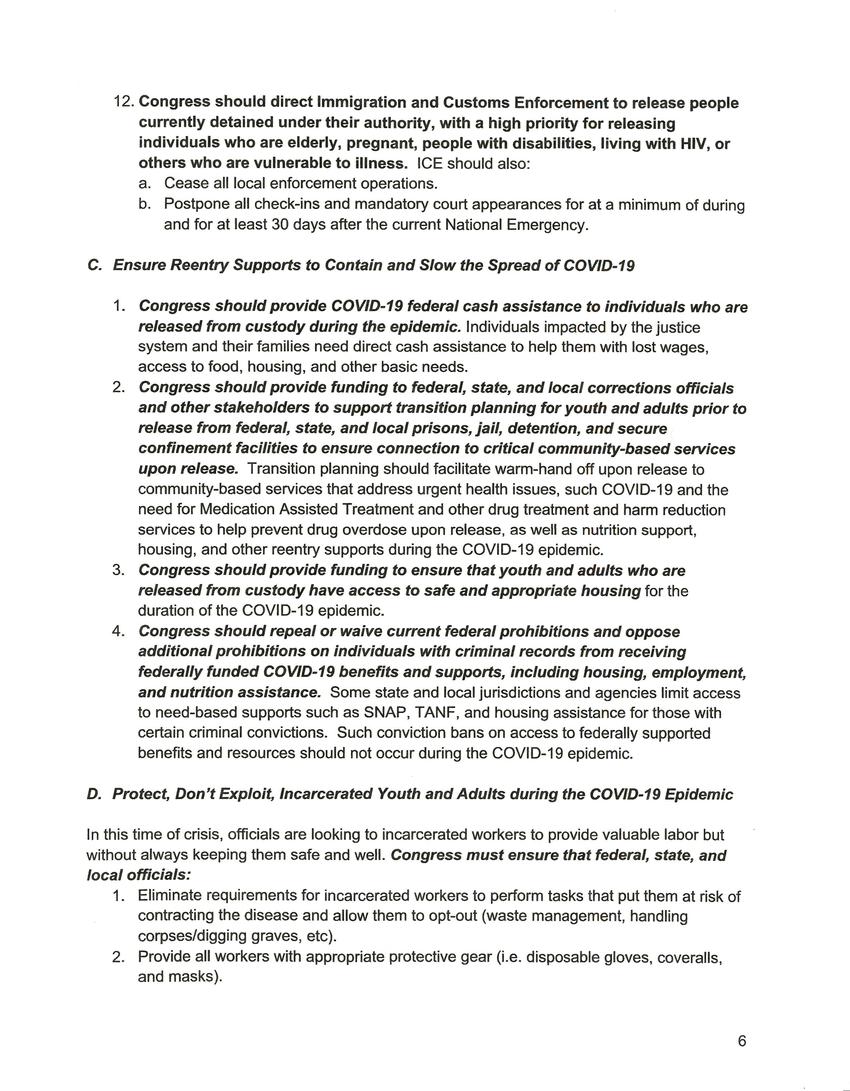

Replies